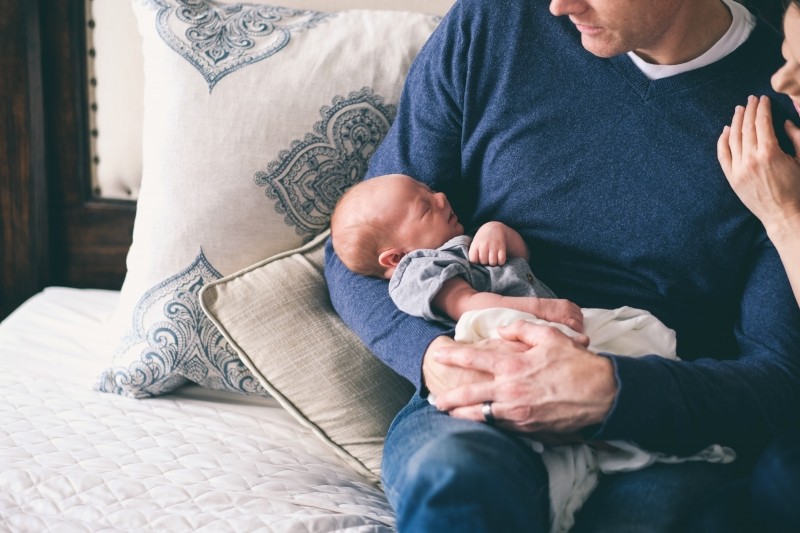With over 250 babies born every week across Melbourne’s west, the need for prevention and early intervention services for parents is crucial.
As any parent will attest, the first year after having a baby is tough. Dads report feeling like the ‘third wheel’ and face challenges with isolation, changes in intimate partner relationships and the transition to parenting.
Those critical first 1000 days (conception to age 2) is a period when some fathers are at risk of isolation and psychological challenges. Fathering research conducted at Tweddle in 2012 by the Parenting Research Centre showed the majority of fathers admitted to a residential program had mental health symptoms.
Data collected from fathers attending Tweddle has shown that 1 in 10 Australian fathers experience clinically significant distress in the first year after having a baby, and these symptoms persist from 1-7 years postpartum for 8% of fathers.
According to Beyondblue, up to 5 per cent of fathers develop postnatal depression and anxiety in the year after having a baby. Costs to the health care system of postnatal mental health challenges in dads is considerable through lost employment productivity, and the short- and long-term adverse effects on child health and family relationships including parent-child relationship problems, family conflict, violence and breakdown.
In 2016/17 Tweddle launched a pilot program called Working Out Dads for men living full or part time with their 0-5 aged children in response to a lack of therapeutic after hours groups for dads.
Working Out Dads is an evidence based, manualised program with weekly activities, resources and objectives. Themes cover parenting, relationships, mental health, fitness and wellbeing. Working out Dads involved 57 participants living in 17 Victorian locations across Melbourne’s west and ten countries of birth.
Working Out Dads combines one hour of facilitated discussion and a 30 minute guided fitness session in a gym. The program includes pre and post mental health and parenting confidence evaluation, handouts and online resources. Fathers reported that attending the program in a fitness based / non stigmatised environment supported their decision to attend.
The objective of Working Out Dads is to connect, support and strengthen the capacity of dads in families where either partner is experiencing stress, anxiety and parenting challenges. There is also a goal to become less isolated and more resilient and supportive during the transition to early parenting, to promote healthy relationships and to prevent family conflict.
Long term benefits include the fitness of fathers and their children (research shows a link between a father’s weight and their pre-school aged children’s weight) and the prevention of inter-parental conflict. Research shows that workplace participation, parent/child attachment and mental health are also improved when dads feel supported and connected.
Working Out Dads program research showed a clinically significant improvement in the fathers’ mental health (with reductions in stress, anxiety and depression) and strengthened confidence in parenting. These important findings have lead to a subsequent pilot evaluation with thanks to a Centre for Excellence in Child & Family Welfare Learning Systems grant.
The Working Out Dads pilot aimed to address a significant gap in knowledge about the effectiveness of early intervention and prevention approaches to promote the health and wellbeing of fathers in the early years of parenting, to inform policy and best practice in promoting the mental health of fathers and the prevention of family conflict.
According to a 2013 Fathering Project paper, evidence from a systemic review of 18 studies indicates that father engagement positively affects social, behavioural, psychological and cognitive outcomes of children. More specifically, high levels of father involvement have been linked to;
- Higher levels of cognitive and social competence
- Increased social responsibility and capacity for empathy
- Positive self-control and self-esteem
- More positive interactions with siblings
- Fewer school adjustment difficulties and better academic progress
Working Out Dads aimed to reduce adverse childhood experiences (ACES) by reducing stress in vulnerable dads, building resilience and developing help seeking behaviours. The key concept underlying ACEs is that stressful or traumatic childhood experiences can result in social, emotional, and cognitive impairments such as increased risk of unhealthy behaviours, risk of violence and disability later in life.
Breakthroughs in neurobiology demonstrate that fear-based childhoods disrupt neurodevelopment, and can actually alter normal brain structure and function. Fear during infancy and early childhood has a cumulative impact on childhood development.
Working Out Dads took action in preventing family conflict. While there are multiple programs and significant resources targeting survivors and perpetrators of family violence, few exist to prevent the conditions and stressors that can trigger inter-relational conflict.
Working Out Dads targeted dads of children aged 0-4, a period where many fathers are at risk of clinically significant levels of distress and perpetuating family violence. Research demonstrates that pregnancy and birth of a first child can be a catalyst for family violence.
The need for interventions to promote fathers’ health and wellbeing in the early years of parenting is overwhelmingly clear. Child, health and family services primarily focus on mothers and yet there is burgeoning evidence supporting the contribution of fathers’ health to the wellbeing of their children.
The Working Out Dads pilot was about social change, yielding significant behaviour change in vulnerable dads with immediate and long term benefits for children, families and communities.
Tweddle is currently seeking partnerships to help deliver the second pilot program which will be evaluated by a grant provided by the Centre for Excellence in Child & Family Welfare.
For more information visit the One Hundred Dads project.

